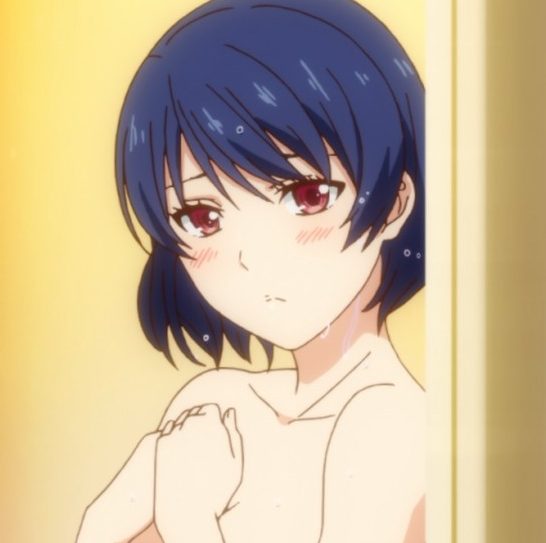 Natsuo is in love with his young, beautiful teacher, Hina. When he is invited to a mixer by a couple of friends his heart isn’t really in it, but he goes along and meets a girl his own age, Rui. She takes him back to her place and suggests a one night stand. Being as he’s a teenage boy, he’s not going to say no to that. It’s not as seedy as it sounds, although the animation does go a bit further than the average anime in terms of what it shows, but the point is that Rui just wants to experience what it’s like and there’s no emotional connection at all. As is typical for the first time, the world doesn’t really move, even if the bed does a bit.
Natsuo is in love with his young, beautiful teacher, Hina. When he is invited to a mixer by a couple of friends his heart isn’t really in it, but he goes along and meets a girl his own age, Rui. She takes him back to her place and suggests a one night stand. Being as he’s a teenage boy, he’s not going to say no to that. It’s not as seedy as it sounds, although the animation does go a bit further than the average anime in terms of what it shows, but the point is that Rui just wants to experience what it’s like and there’s no emotional connection at all. As is typical for the first time, the world doesn’t really move, even if the bed does a bit.
Now here comes the massive, silly coincidence that you just have to roll with and move on. It turns out that Rui and Hina are sisters, and their mum is going to marry Natsuo’s dad, so his first love and his first sexual experience both end up living with him. From that absurd start, the writers manage to weave together a compelling love triangle series, which examines the messiness of romantic feelings and physical desire. This is everything I wanted Scum’s Wish to be, and everything it failed miserably to achieve, “miserable” being the operative word, because Domestic Girlfriend instead plays with that fine balance of euphoria and despair that can typify young love, whereas Scum’s Wish was just unremittingly bleak. Domestic Girlfriend has hope as well, and that makes it by far the more watchable series.
It also gets the fanservice just right, if you can even call it that. This is far from the typical titillation you find in many anime series, the sniggering display of half-concealed boobs and butts in hot springs or skimpy bikinis. Instead it’s a raw and stark representation of physical intimacy, and it’s far from being the point of the series. This isn’t about lazily getting the characters naked as often as possible. There are a couple of quite explicit scenes that bookend the series, but other than that everyone is just getting on with the business of telling a really compelling story. It’s only ever nudity to tell a story, rather than fanservice for its own sake.
Although the love triangle involving a teacher might seem gratuitous, in fact it’s used as a very clever way to expand the story from the realms of teenage crushes to something far more adult. Hina is already in a relationship, and it’s a messy one. Her life choices invite judgement, and then every step of the way our assumptions turn out to be wrong. There is an important point here: other people’s love lives might seem unhealthy and something they should walk away from, but that outsider perspective can be misleading, and life is about shades of grey. Our reactions to some major revelations during the series inevitably mirror the distaste that Natsuo and/or Rui feel, but as we gradually learn more about the nature of Hina’s messy relationship we realise that we judged too quickly, and her boyfriend, once allowed to speak for himself, isn’t quite the monster he seemed to be while he was kept as an off-screen bogeyman.
There are also strong parallels that crop up in certain aspects of the different relationships or desired relationships, that help us understand the complex emotional equation of one set of feelings via the consequences and feelings of another. The secondary characters play a vital part in this, although they sometimes tend to be disposed of too easily and tidily by the writers when the focus shifts elsewhere. The prime example is Momo, whose motivations and feelings are just starting to be explored when she is basically dumped unceremoniously out of the narrative, only making irrelevant cameo appearances after that point. That’s a great shame, because her characterisation is complex and fascinating, and I think her story is probably the most important one that the series tries to explore. Everyone at her school thinks she is a slut, to the extent that people get warned off of having anything to do with her. Scratch the surface of that bad reputation and you find a girl who is horribly broken by her past, and is desperately reaching for something she can’t quite find.
Domestic Girlfriend shows us messy examples of desire, and then comes close to giving us the other side of the coin: the joy of mutual love. But whatever happens, somebody has to get hurt, and the unfinished nature of the series feels about right for the subject matter. For a story that shows us the frustrating complexity of attraction, it makes perfect sense that we should be denied the banality of a happily ever after, with the hope of that possibility suggested and never abandoned. This feels like the moment love-triangle anime grew up. RP






